- Home
- Iris Murdoch
The Sacred and Profane Love Machine
The Sacred and Profane Love Machine Read online
Penguin Books
The Sacred and Profane Love Machine
Iris Murdoch was born in Dublin of Anglo-Irish parents. She went to Badminton School, Bristol, and read classics at Somerville College, Oxford. During the war she was an Assistant Principal at the Treasury, and then worked with U.N.R.R.A. in London, Belgium and Austria. She held a studentship in philosophy at Newnham College, Cambridge, for a year, and in 1948 returned to teach philosophy in Oxford as a Fellow of St Anne’s College. In 1956 she married John Bayley, teacher and critic. She was awarded the C.B.E. in 1976 and was made a D.B.E. in the 1987 New Year’s Honours List.
Her other novels are Under the Net (1954), The Flight from the Enchanter (1955), The Sandcastle (1957), The Bell (1958), A Severed Head (1961), An Unofficial Rose (1962), The Unicorn (1963), The Italian Girl (1964), The Red and the Green (1965), The Time of the Angels (1966), The Nice and the Good (1968), Bruno’s Dream (1969). A Fairly Honourable Defeat (1970), An Accidental Man (1971), The Black Prince (1973), winner of the James Tait Black Memorial Prize, The Sacred and Profane Love Machine (1974), winner of the Whitbread Prize, A Word Child (1975), Henry and Cato (1976), The Sea, The Sea (1978), for which she won the Booker Prize, Nuns and Soldiers (1980), The Philosopher’s Pupil (1983) and The Good Apprentice (1985). She has also written The Fire and the Sun: Why Plato Banished the Artist (1977): based on her 1976 Romanes lectures, A Year of Birds (1978), a volume of poetry, and Acastos: Two Platonic Dialogues (1986).
Iris Murdoch
The Sacred and Profane
Love Machine
Penguin Books
PENGUIN BOOKS
Published by the Penguin Group 27 Wrights Lane, London W8 5TZ, England Viking Penguin Inc., 40 West 23rd Street, New York, New York 10010, USA Penguin Books Australia Ltd, Ringwood, Victoria, Australia Penguin Books Canada Ltd, 2801 John Street, Markham, Ontario, Canada L3R 1B4 Penguin Books (NZ) Ltd, 182-190 Wairau Road, Auckland 10, New Zealand
Penguin Books Ltd, Registered Offices: Harmondsworth, Middlesex, England
First published in Great Britain by Chatto & Windus 1974 First published in the United States of America by The Viking Press 1974 Reprinted 1979, 1981, 1983, 1984, 1986, 1988
Copyright © Iris Murdoch, 1974 All rights reserved
Printed and bound in Great Britain by Cox & Wyman Ltd, Reading Set in Linotype Times
Except in the United States of America, this book is sold subject to the condition that it shall not, by way of trade or otherwise, be lent, re-sold, hired out, or otherwise circulated without the publisher’s prior consent in any form of binding or cover other than that in which it is published and without a similar condition including this condition being imposed on the subsequent purchaser
To Norah Smallwood
The boy was there again this evening, and the dogs were not barking.
David stopped in the act of pulling his curtain against the dark twilight and gazed intently down into the garden. The boy was standing under the acacia tree, just on the near-side of the fence that divided the Hood House garden from the orchard. The figure was so still so merged into the blotchy spotty half-darkness of the scene that David would have been at a loss to explain how it was that he was so sure that it was a boy and that the boy was staring at the house. In fact, he had seen the shadowy boy before, two days ago, scarcely more clearly, at about this time. A small figure, a small boy, eight or nine years old perhaps. Why did none of the dogs bark?
David jerked the curtain across and turned on the light. He felt no urge to go down and investigate. The pulling of the curtain had already made the incident seem unreal and unimportant. A sensation which he felt almost all the time now, a sort of mild aching disgust and lassitude, made him unable to concentrate his mind. He sat down heavily upon a chair and turned unfocused eyes upon the blur of bis school books lying about him upon the floor. Then with an involuntary evasive movement he turned back towards the window curtain and blinked hard three times.
He had just been engaged in removing the paper covers from all his books. A large cardboard box contained the mass of glossy sturdy polychrome smashed-up jackets which in a sudden fit of irritable energy he had ripped off, revealing the glowing sides and discreet gilded lettering of the volumes beneath. There was no doubt about it, the books looked more beautiful and more real without their covers. Montague Small had once told him that he had celebrated his fortieth birthday by thus undressing all his library. ‘A wrapped up book is waiting for something,’ said Montague. David had decided not to let his wait for his seventeenth birthday. He picked up a sleek slim dark blue book and stroked it. Catullus, Oxford Classical Text. Excrucior.
The pain in question was not the agony of love, however, and women were not yet David’s problem, apart from his mother of course. He was visited by highly localized burning erotic anguishes which he relieved (with distaste but without guilt) in the privacy of his room. He dreamed of a Miranda, but none had so far appeared, and the exclusively masculine life of his day school was devoid of love objects. His distress was obscurer, a sort of fear of never being able to be a real person at all. He felt obscenely amorphous, globular, a creature in metamorphosis trailing a half discarded form. Even his terrors were blunted and unvivid, not enlivening. Lassitude and disgust staled all.
David was a fastidious boy. The wet red mouths of the dogs offended him, and the sight of bis mother smiling upon that row of slobbering noisy feeders. He noticed how things dropped from his father’s fork at meal-times, even from his father’s lips: his father who now turned crimson in the face after a second glass of wine. The involuntary spasms of the body, its slimy moist interior, inspired horror. Shameless kissing in the cinema made him turn away. He would have given up eating altogether if that had been possible, would at any rate have eaten only in private, picking up dry small fragments with his fingers. Any slovenly messiness in the kitchen made him squeamish. His mother licking a spoon, then using it to stir the food. Greasy stuff trodden underfoot. The dogs made the garden foul, however much his mother ran about, and sometimes inside the house itself a vile smell would destroy both appetite and peace. They were not even very nice dogs. An early reading of the The Hound of the Baskervilles had made David afraid of dogs. Only of course he told nobody about this.
Last night he had dreamt about a huge blue fish struggling in the breaking waves upon the very edge of the sea. As it opened its dripping mouth towards him he had seen that its tail was half a girl with long flailing legs. He woke in horror to the sound of a howling dog. He had so often told his dreams to his father when he was a small child, it was as if his father still roamed inquisitively in his dream world, a co-spectator rather than a denizen. A blessed silence upon almost every subject had fallen between them in the last year. After the dream, he had lain awake tormented by images, faces that imposed themselves upon his closed eyes. Often it was the face of Christ, hanging just before him as upon a veil, amazingly beautiful, then turning gradually into a sneering mask. Christ was a problem to David. Prayer had been an addiction once, but the perpetual presence of this ubiquitous intrusive Friend amounted now almost to hallucination. Why had such a weird belief been induced in him when he was too young to defend himself against it? And how had his mother’s vague gentle faith and the mild Anglicanism of his public school spawned in him the secret superstitions of a mopping mowing slave? Compulsive stupid rituals had replaced those frenzied conversations with God. There was a smelly intimacy about it all, connected with his mother, his mother’s knee, sentimental gushings of a ridiculous familiarity offered to a deity devoid of dignity, devoid of austerity, devoid even of mystery, but now just proving horribly hard to get rid of.
Moving tow
ards the door he saw himself in the long mirror which his mother had insisted on installing. He looked at himself, at his slim figure and blue-eyed long-tressed head. His hair, flaxen at birth, was still a lightish gold. Long uncut it fell in unruly Pre-Raphaelite splendour to his shoulders. He looked at his thinness and his straightness and his cleanness. He was a solitary being, he thought, a loner, always would be. Sometime soon he would be a man: he pronounced the word to himself as if one were to say a gryphon, a chimera.
Then he smiled at his image, suddenly finding it ridiculous. He had always seen himself as the Beloved Disciple.
Harriet Gavender (neé Derwent) had also seen the boy; only in her case it was the first sighting. And she too had noticed the silence of the dogs. Coming out quietly into the midsummer twilight of the still garden to breathe the rich polleny fragrance of the silent air, she had seen the small perfectly motionless figure standing just beside the fence of Monty’s orchard, merged almost into the dark trunk of the acacia tree. Harriet stopped abruptly upon the paved terrace and great fear invaded her heart. Why? Surely there was nothing to be afraid of in an inquisitive trespassing child. Then she recalled a dream which she had had on the previous night. She had dreamt that she was in her bedroom, in her bed (only Blaise was not with her), and that she had awakened in the darkness to see a strange light shining at the window. This is no dream, she said to herself as she rose in fright and went to look out. Just outside in the branches of a tree was the source of light, a radiant child’s face, the face only, suspended there and looking at her. She ran back at once and burrowed under the bedclothes, thinking in great terror: suppose that face were to come and look at me through the window?
The dream, only now remembered, seemed to dazzle her for a moment, and turning her head away towards the sombre facade of the house she suddenly saw the dim face of her son at the window of his darkened room. David too was gazing down the garden, looking at what she had seen. He did not notice his mother. After another moment he pulled his curtain across and the light came on brightly behind it. Harriet looked down the garden again. It all seemed to have become much darker. The boy was gone. A bat had noiselessly appropriated the space between, a flittering weaving almost substanceless fragment of the invading dark. Had the child, she wondered for a moment, been really an apparition, a visitor strayed over the border from another world? Or had she imagined that small silent watcher? How stupid I am, she thought. It’s just a boy, it’s nothing at all.
She walked out a little way on to the lawn, breathing deeply and sighing. A collared dove groaned once in the final light. A pink rose reclining upon the big box hedge glimmered with contained electric luminosity. A blackbird, trying to metamorphose itself into a nightingale, began a long passionate complicated song. The birds sing so much more carefully in the late evening. The great cloud fields had faded behind the bumpy tops of the orchard trees, whose silhouette was so familiar to Harriet that she seemed to be thinking it rather than seeing it, and the sky had dulled to a sort of dark light-less white netted over with grey, a colour which it would retain all night. It was midsummer. Midsummer night in fact, Harriet thought. The thought came to her with a bittersweet sense of time passing. How much she loved the slow parade of the English year, and how sad it was too, with its increasing store of memories. And her mind flew back to the summer balls of her girlhood when, in a totally vanished world, she had danced all night in the arms of agile lieutenants.
A light had come on in Monty’s house, obscured by the trees but gleaming through them. Harriet walked as far as the fence and looked at the light. What was Monty doing now? Moping? Weeping? Did he really not want to be visited? Harriet’s woman’s heart yearned towards the mystery of the sad solitary man. Montague Small occupied the adjacent house which was called Locketts, a smaller place which the then owner of Hood House had made to be built about 1900, and had subsequently occupied, at the bottom of his own very extensive garden. Most of the garden, including the orchard so much coveted by Blaise, now belonged to Locketts, and Hood House, which had later been sold separately, had only a square of lawn to bless itself with, and the long fat box hedge and the acacia tree and Harriet’s herbaceous border and her few roses. As Blaise had often observed, the logical way to divide the garden would have been to cut it beyond the orchard, which was continuous with the Hood House garden, whereas the garden ‘proper’ of Monty’s house was at a right-angle, round a corner, and in fact the house was in another road. But as Harriet said to her complaining husband, perhaps Mr Lockett (for he had called his new house after himself) had not been a very logical kind of man.
Because of the form of the garden, and also because Locketts was such a charming and somehow significant little house (quite a gem of art nouveau) it had always been a matter of great importance to the Hood Houseites who their neighbour was. Of course they had another next door neighbour, but that was an elderly lady, a Mrs Raines-Bloxham, who politely declined to know them. (This was not snobbery: she politely declined to know anybody.) And when the Gavenders had first come to Hood House, not so very many years ago, Locketts had been empty. The arrival of Montague Small (the Montague Small, as David, who was a thriller reader, had gleefully informed them) and his intense pretty little Swiss ex-actress wife had aroused an interest and a curiosity which were not long unsatisfied. The Smalls were gratifyingly friendly though the tiniest bit aloof. It seemed so right that it should be a writer’s house, Harriet had thought. They all liked Monty. Harriet pretended to like Sophie, and tried to, but never quite did. For Harriet, Sophie was hopelessly foreign. As for Blaise, he prayed openly ‘Oh Lord, let that woman never want to be a patient of mine!’ Then a bit later Monty had come round one day with an utterly changed face to tell them that Sophie had cancer. There had been an interval of withdrawal, Monty cold, Sophie invisible. Then Sophie died. That was now nearly two months ago. Monty was very very bereaved. ‘I have never seen a man mourn so,’ said Blaise.
Harriet turned back across the dim garden. The lightless light looked down from the white night sky. The blackbird’s long song was over. A distant owl was hooting. One star was visible. Jupiter, David had told her. Venus did not rise until after two. How thick the silence was, though it was not really country here of course, not like in Wales in her childhood. Wilder Buckinghamshire was a little away, and the houses went on continuously among the trees in the direction of London, whose pink glare illuminated the night sky in winter. A light had just come on in Blaise’s study. How pretty, how foursquare, how quite ridiculously housey Hood House looked with its shallow slate roof and its pretty flint and stone patterning and its tall early Victorian windows, quite the oldest as well as the handsomest house in its area. A sort of seaside house she thought of it as being, without quite knowing why. Perhaps the little white wrought-iron balconies on the first floor gave it that slight air of marine quaintness. It was not a very big house but it was the grandest house that Harriet had ever lived in. She and Blaise had been far from well off when they got married.
There was a soft soundless flurry and something wet and warm brushed Harriet’s hand. It was the nose of Ajax, the black Alsatian. Then all the dogs were suddenly round about her, not ecstatic but gently pleased with her, undulating in a circular ballet of quiet orderly prancing. The dogs had been a lovely accident really. They were her pets, not David’s, not Blaise’s. They were outdoor dogs of course. They lived, in as much comfort as Harriet could contrive, in the old garage. She had wanted to bring little Ganimede into the house once, but it had proved impossible to house-train him. Dogs, like humans, can be disturbed for ever by an unhappy childhood. Anyway it had seemed so unfair to the other dogs of whom at that time there were four. Now there were seven in all: Ajax, the Alastian, Ganimede, a black miniature poodle, Babu, a black spaniel, Panda, a black labrador mongrel with white markings, Buffy, an airedale, Lawrence, a Welsh collie, and Seagull, a small black and white terrier. The idea that they should all be black and have classical names had been early aba
ndoned. Harriet had originally acquired Ajax because she felt nervous at Hood House when Blaise was away from home at night, as he sometimes had to be to see patients. (Magnus Bowles, for instance.) When she was a child she had had a^ morbid fear of cats, and used to search her bedroom carefully every night in case a cat had secreted itself there. In later life she feared burglars, tramps, gipsies, violent intruders. Of course Blaise had told her that burglars symbolized sexual intercourse, but this interesting revelation did not cure her fright or prevent her from holding her breath to listen for strange noises in the dark. Harriet had acquired Ajax as an adult dog from the Battersea Dogs Home, and then the thing had become rather an addiction. ‘When you feel depressed you go and pick a dog!’ said Blaise with exasperation. But it was so touching to go there and rescue some pathetic affectionate beautiful animal, it was a kind of creative act.
‘No, outside, boys, outside, boys,’ she murmured. ‘You’ve had your dinners. Now be good dogs.’ She shut the kitchen door upon the concourse of dark muzzles and turned on the light. Harriet had never let Blaise modernize the kitchen and, also in spite of him, they usually took their meals there, at the rectangular deal table covered by its red and white check cloth. The big chaotic rather obscure room suited Harriet. It was friendly and undemanding and smelt humbly of the past, full of dark lined old wood that needed scrubbing. She passed through it now, gazing unmoved upon a pile of greasy plates, and mounted the stairs, resisting as usual the usual temptation to go and call on her son, and went into her ‘boudoir’. This was a tiny cluttered room, originally a dressing-room. Blaise’s more austerely pretentious taste reigned in the rest of the house. Harriet, who could not bear to discommode a spider and who would spend ten minutes washing a lettuce rather than let any minuscule creature inadvertently elude rescue, extended her charity in a quite instinctive way to things. Now that both her parents were dead most of the serious family stuff was at Adrian’s flat in London, but Harriet had carried away, together with her various childhood treasures, a lot of awkward homeless oddments, brass ornaments and such, which no one else seemed to want or love, and which now mingled with an exotic miscellany of gaudy little gifts which Adrian and her father had brought her from various parts of the world, from Benares, from Bangkok, from Aden, from Hong Kong, the casual spoils of innumerable bazaars, jars and trays and boxes, little animals, little men, little gods of whom she did not know the names, all that ‘junk shop rubbish’ for which Blaise scolded her so, although he secretly found her absurd animism rather touching. And now, stuffed into the middle or hanging on to the edges, were the things that Monty had given her lately, since Sophie died, handing them out at random whenever she called, plates, ornaments, cushions, bits of embroidery, as if he wanted to strip Locketts and deprive it of all memory.

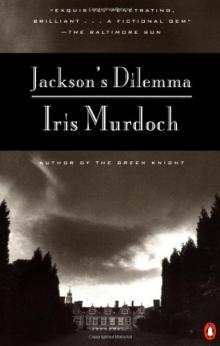 Jackson's Dilemma
Jackson's Dilemma The Flight From the Enchanter
The Flight From the Enchanter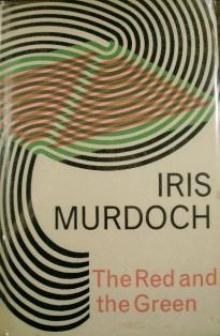 The Red and the Green (Vintage Classics)
The Red and the Green (Vintage Classics)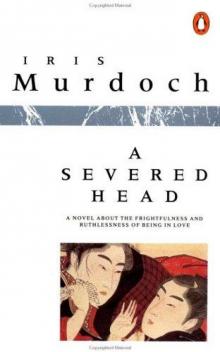 A Severed Head
A Severed Head The Black Prince
The Black Prince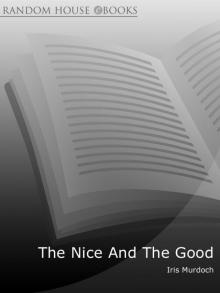 The Nice and the Good
The Nice and the Good The Unicorn
The Unicorn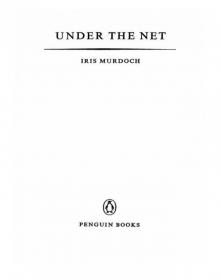 Under the Net
Under the Net The Italian Girl
The Italian Girl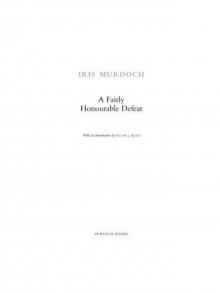 A Fairly Honourable Defeat
A Fairly Honourable Defeat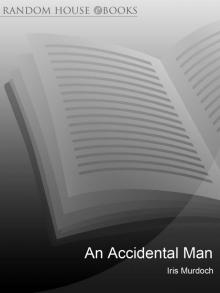 An Accidental Man
An Accidental Man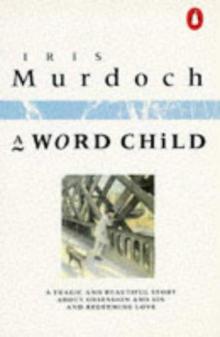 A Word Child
A Word Child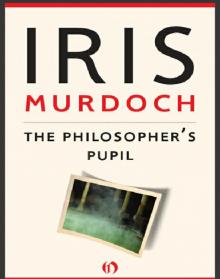 The Philosopher's Pupil
The Philosopher's Pupil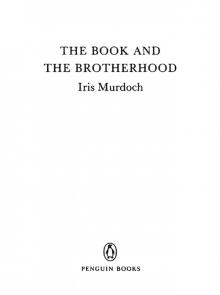 The Book and the Brotherhood
The Book and the Brotherhood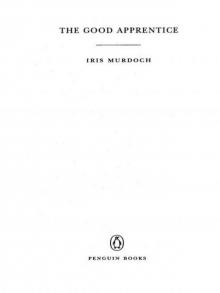 The Good Apprentice
The Good Apprentice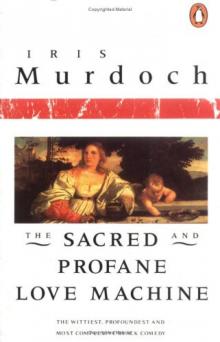 The Sacred and Profane Love Machine
The Sacred and Profane Love Machine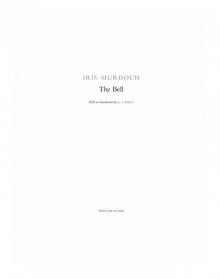 The Bell
The Bell Henry and Cato
Henry and Cato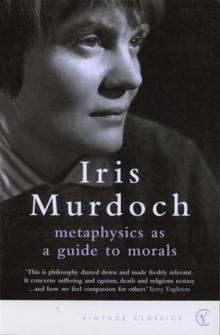 Metaphysics as a Guide to Morals
Metaphysics as a Guide to Morals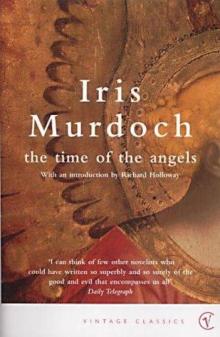 The Time of the Angels
The Time of the Angels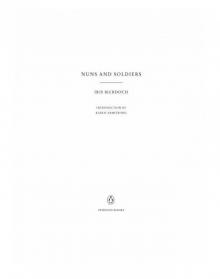 Nuns and Soldiers
Nuns and Soldiers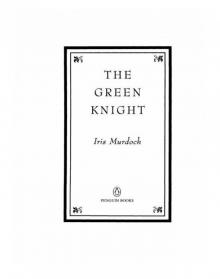 The Green Knight
The Green Knight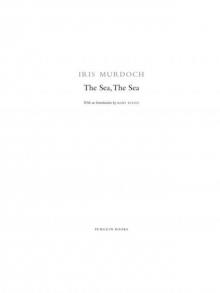 The Sea, the Sea
The Sea, the Sea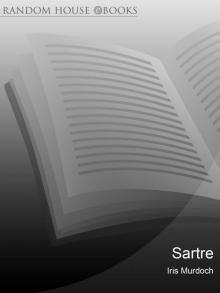 Sartre: Romantic Rationalist
Sartre: Romantic Rationalist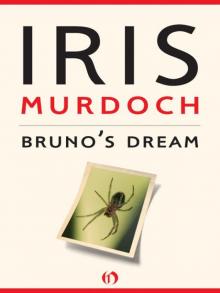 Bruno's Dream
Bruno's Dream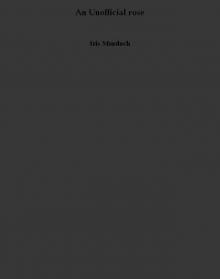 An Unofficial rose
An Unofficial rose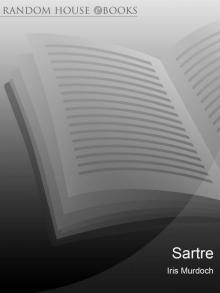 Sartre
Sartre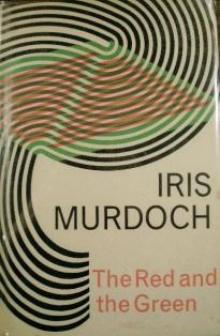 The Red and The Green
The Red and The Green